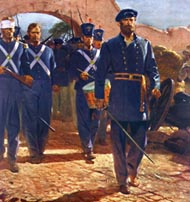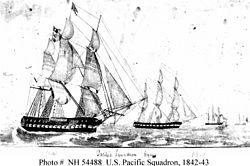Siege of San José del Cabo facts for kids
Quick facts for kids Siege of San José del Cabo |
|||||||
|---|---|---|---|---|---|---|---|
| Part of the Mexican–American War | |||||||
 American Marines during the Mexican War. |
|||||||
|
|||||||
| Belligerents | |||||||
| Commanders and leaders | |||||||
| Strength | |||||||
| 27 marines 15 seaman 20 Californians 102 Cyane sailors and marines |
~300 | ||||||
| Casualties and losses | |||||||
| 3 killed 4 wounded 8 captured |
13–35 killed | ||||||
The Siege of San José del Cabo was a long battle during the Mexican–American War. It happened from January to February 1848. In this fight, Mexican fighters surrounded a smaller group of American Marines, sailors, and local Californian soldiers. The battle ended when a rescue team from a warship arrived. They helped the American soldiers break the siege and win the battle.
Why the Siege Happened
After an earlier fight called the Battle of San José del Cabo, a Mexican Army leader named Manuel Pineda decided to surround the American forces. A ship called the Southampton left for Mazatlán on December 5. But another ship, the Portsmouth, stayed until January 4, 1848. This was to keep the American soldiers safe.
Commander Montgomery helped Lieutenant Charles Heywood make their defenses stronger. They bricked up the large windows of their mission fort. They also built a wall on the roof to protect against attacks. The American group grew to over 70 soldiers. This was because 16 men and two extra guns came from the Portsmouth. Also, 26 more soldiers had arrived earlier from the Southampton.
The Siege Begins
On January 22, eight American men were captured by the Mexican fighters. This happened while they were trying to find a relief ship. After this, Pineda's force of about 300 men, including Yaqui people, attacked the fort every day.
The American soldiers and about 50 women and children inside the fort were cut off. They had to live on half their usual food, mostly salted meat, and had no bread. On February 7, one of the Californian volunteers was killed. By February 10, Manuel Pineda's fighters had taken over almost all of the town. Only the mission fort, called the cuartel, was still held by the Americans.
On February 11, a young officer named Tenant McLanahan was badly wounded and later died. The next day, the Mexican forces captured the fort's main water supply. A new well the Americans dug also came under Mexican gunfire.
Help Arrives
On February 8, Lieutenant Archibald McRae from a nearby American group reached Lieutenant Heywood. He saw how serious the situation was. He then sailed to Mazatlán to tell Commodore William B. Shubrick. A Commodore is a high-ranking naval officer. Shubrick sent the Southampton to another town. This allowed the USS Cyane to go and help San José del Cabo.

At 3:30 PM on February 14, the Cyane arrived near San José del Cabo. The next morning, 89 sailors, 5 Marines, and 8 officers landed on the beach. They also brought a field gun, which is a type of cannon. Captain Dupont was in charge of this landing party.
The group from the Cyane moved towards a small village called San Vicente. This is where the Mexican fighters had gathered. But this did not stop Captain Dupont's advance. The guns of the Cyane also helped by firing from the ship. Lieutenant Heywood took 30 of his men and attacked the Mexicans still in the town. Then, he joined up with the men from the Cyane.
What Happened Next
The Mexican forces retreated to Las Animas and then to San Jose Viejo. The United States military sent more soldiers. They continued their attack under Colonel Burton from La Paz. The Americans captured Pineda in a surprise attack on his base. This was in San Antonio, a few miles south of La Paz.
On March 30, 1848, Burton's forces defeated the remaining Mexican soldiers. These forces were led by Governor Castro. This happened in a small fight called the Skirmish of Todos Santos. Soon after returning, the American soldiers learned about a truce (a stop to fighting) on March 6. They also heard about a peace treaty that officially ended the war.
 | George Robert Carruthers |
 | Patricia Bath |
 | Jan Ernst Matzeliger |
 | Alexander Miles |

